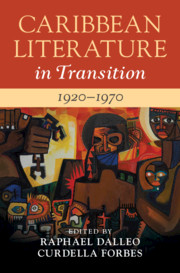Book contents
- Caribbean Literature in Transition, 1920–1970
- Caribbean Literature in Transition
- Caribbean Literature in Transition, 1920–1970
- Copyright page
- Contents
- Figure
- Contributors
- Introduction
- Part I Literary and Generic Transitions
- Part II Cultural and Political Transitions
- Part III The Caribbean Region in Transition
- Part IV Critical Transitions
- Chapter 18 Forging the Critical Canon
- Chapter 19 Forgotten Trailblazers
- Chapter 20 Recuperating Women Writers
- Chapter 21 Rhizomatic Genealogies
- Chapter 22 Writing Indo-Caribbean Masculinity
- Chapter 23 Writing and Reading Sex and Sexuality
- Bibliography
- Index
Chapter 20 - Recuperating Women Writers
from Part IV - Critical Transitions
Published online by Cambridge University Press: 16 December 2020
- Caribbean Literature in Transition, 1920–1970
- Caribbean Literature in Transition
- Caribbean Literature in Transition, 1920–1970
- Copyright page
- Contents
- Figure
- Contributors
- Introduction
- Part I Literary and Generic Transitions
- Part II Cultural and Political Transitions
- Part III The Caribbean Region in Transition
- Part IV Critical Transitions
- Chapter 18 Forging the Critical Canon
- Chapter 19 Forgotten Trailblazers
- Chapter 20 Recuperating Women Writers
- Chapter 21 Rhizomatic Genealogies
- Chapter 22 Writing Indo-Caribbean Masculinity
- Chapter 23 Writing and Reading Sex and Sexuality
- Bibliography
- Index
Summary
The conventional account of anglophone Caribbean writing from the nationalist period often tends to focus on male writers. Early articulations of a Caribbean literary tradition overlooked many writers, especially women, who did not fit into the frameworks of canon-builders like Kamau Brathwaite and Kenneth Ramchand. Almost up to the end of the 1970s, Jean Rhys remained the single widely known woman author, while a generation of writers who were arguably closer to changing Caribbean realities were neglected. During the past twenty years, scholarship on Caribbean writing has sought to recuperate these writers and take seriously their contributions, addressing how these might challenge conventional accounts of Caribbean literary cultures and characteristics. The result has been an expanded sense of the aesthetic and political projects of the period – a period marked by significant sociopolitical change in countries increasingly asserting cultural specificities and moving towards political autonomy. This essay focuses on five early anglophone Caribbean women writers of diverse backgrounds: Phyllis Shand Allfrey, Amy Jacques Garvey, Una Marson, Elma Napier, and Sylvia Wynter. While making different aesthetic choices, these authors gave passionate voice to the dominant concerns of their time – in particular the anticolonial struggle, socioeconomic disparities, and racial/cultural identity – as well as articulating issues of gender.
Keywords
- Type
- Chapter
- Information
- Caribbean Literature in Transition, 1920–1970 , pp. 323 - 336Publisher: Cambridge University PressPrint publication year: 2021

